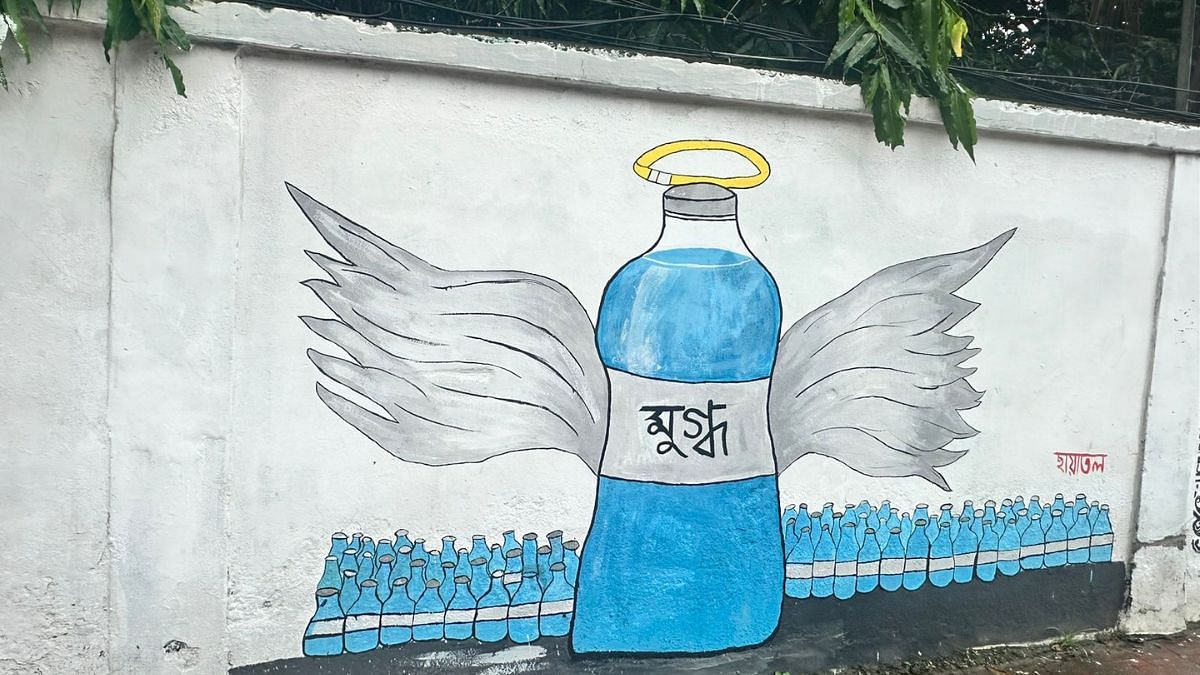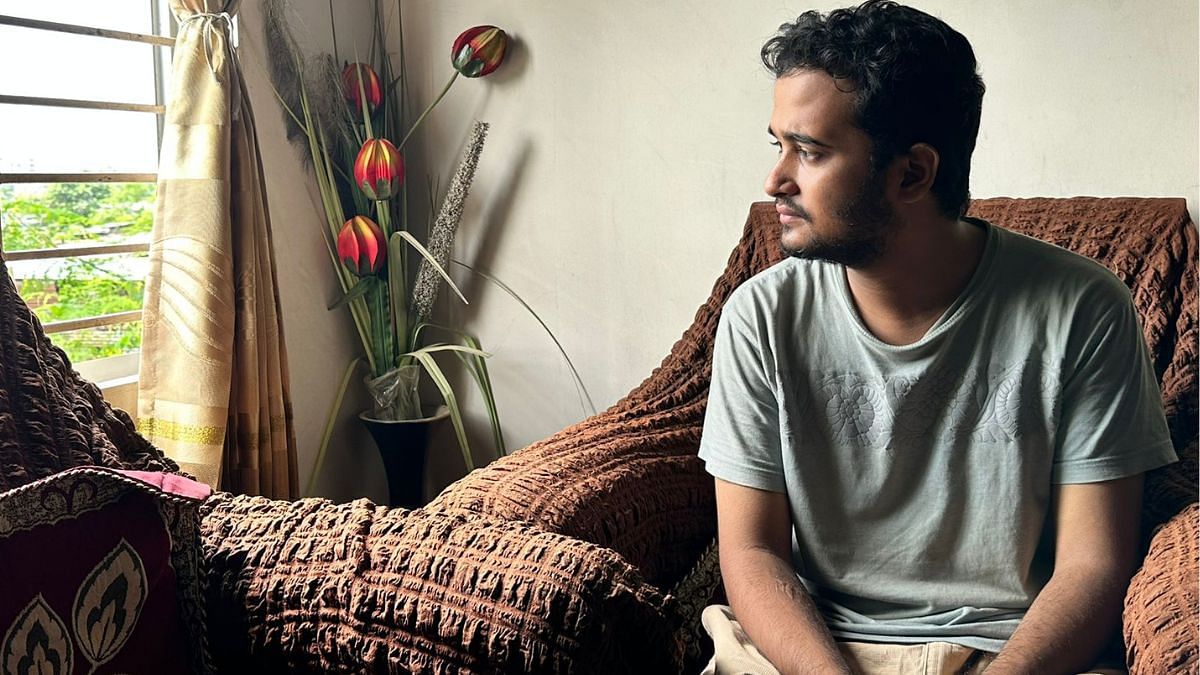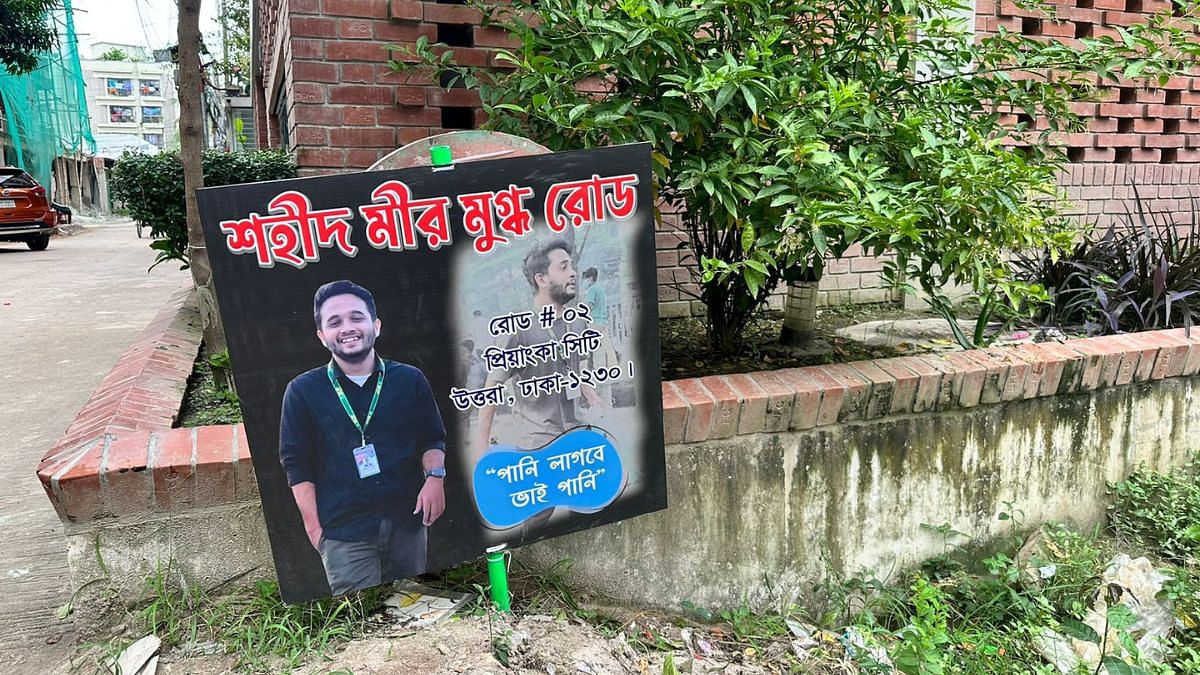Dhaka: Paani lagbe, paani? (You need water, water?)
This phrase, which became a powerful slogan during Bangladesh’s student-led protests against the job quota system, is scrawled across walls in Dhaka.
Its origin traces back to the last words of Mir Mahfuzur Rahman Mugdho, a Master’s student at the Bangladesh University of Professionals, who the police allegedly shot dead on 18 July while he had been distributing water and biscuits to fellow protesters.
Mugdho was one of the first students to be killed during the protests, igniting widespread outrage. After the police allegedly shot him in the head, the 25-year-old lay on the ground, bleeding, bottles of water, and packets of biscuits still in his hand. The video of this went viral on social media. His last words before being shot—“Paani lagbe, paani?”
In the weeks that followed, hundreds, including children, were killed in police action and the initially peaceful protests turned violent, leading to the ouster of Sheikh Hasina on 5 August.
Mugdho’s last words became a symbol of the movement. The slogan’s graffiti—now part of Dhaka’s street art—is a testament to the raging student protests that created history and changed Bangladesh’s political landscape.

Yet back at Mugdho’s home, there is a sense of emptiness, an unfillable void.
Though he is gone, his twin brother, Snigdho, a law student, feels the weight of living two lives—his and Mugdho’s.
Since Mugdho’s death, he has not felt comfortable looking into the mirror as his face reminds him of his brother.
But, for his family, Snigdho now embodies both brothers.
“For my parents, now I am both Snigdho and Mugdho. My mother still calls out Mugdho’s name, and I run to her,” Snigdho says, speaking to ThePrint. That, he says, gives her some sense of “comfort”, “allowing her to hold on to the disbelief that he is still alive”.
Snigdho says his mother has not visited Mugdho’s grave as she does not want to come to terms with reality. “She has also stopped coming to our room, where she would come and sit for hours to talk to us. She knows she will not find both of us sitting there. She knows he is no more but does not want to accept.”
The responsibility of carrying on Mugdho’s legacy is “overwhelming, tough, and heavy on his heart”, he adds.

Snigdho admits that since Mugdho’s death, he has lost a sense of his own identity, choosing instead to live as his brother so their parents don’t feel the loss, the void.
“It is very hard for me to carry his identity. He had big dreams of going to Switzerland to get his MBA and then to take our parents there, too. He wanted to travel the world and make my parents visit wonderful cities abroad. I had no such dreams. But now his dreams are my dreams,” he says.
“His priority was always my parents. He was the responsible one. But now that duty is mine. I need to ensure I fulfil whatever promises he made to my parents. That is my goal now,” he adds.
‘He never wanted a government job’
Snighdho says Mugdho always felt strongly for student rights even though he never aspired to get a government job in Bangladesh. He says Mughdho was not part of the protest for quota reforms but for human rights and freedom of speech, curtailed by Hasina’s regime.
Mughdho did not care about politics per se but rights, he says.
“He never wanted a government job but felt strongly for the rights of students. He knew how those rights had got curtailed, and when these protests began, he was part of it from the beginning, facilitating and extending whatever help students needed,” Snigdho says.
On the day the police allegedly shot him, Mugdho was just distributing water and biscuits to protesters and did not have a weapon or stones in his hand, Snigdho says.
Recalling the conversation with his brother just a few days before his death, Snighdho says, “He told me that students have a very legitimate demand, and so we must do something to help.”
Snighdho recalls that his brother started writing Facebook posts supporting the students, calling out the Hasina government and the atrocities it had committed.
On 17 July, Mugdho told his brother to join the protests too. He told Snigdho that even if they cannot be on the frontline, both should help students at the backend.
Snighdho agreed, and the two were supposed to go to the protest site to distribute water together on 18 July.
Snigdho, however, could not join his brother on 18 July because he met with a minor accident and injured himself and decided to rest at home.
That was the day when Mugdho was shot dead.
“I regret not being there that day,” Snighdho says.
Mugdho’s friends, who were at the spot when the police opened fire, told Snighdho what had happened later.
“There was a lot of chaos. After distributing water, Mugdho and his friends sat on the roadside to rest, and that is when the police came to disperse the crowd. That is when people started running. Since there was smoke from tear gas, Mugdho kept rubbing his eyes and asking people to take water from him. That is when a bullet came and hit him in the head. He died on the spot,” Snigdho says.
Snighdho says Mugdho had participated in student protests in the past. He says he never thought that the government would kill civilians like his brother by firing indiscriminately.
‘Happy he could do something for the movement’
The street leading to Mugdho’s house was renamed in his honour and has several banners of his picture everywhere. Snighdho says that Mugdho always wanted to become the face of students’ rights, but the family did not know it would come at this cost.
He says that although his family will never be able to overcome the grief of losing Mugdho, he is happy that everyone remembers Mugdho as a hero.
“He was so passionate about student rights, always stood by the truth and wanted to play a key role in change. He always was at the forefront of most of these protests. So I am happy his contribution to the movement is being recognised and acknowledged by the entire country,” he says.

He, however, adds that every student who has lost his, or her life in these protests must be acknowledged. “It is not just Mugdho but hundreds of others who laid their life for the country. They all deserve to be recognised, celebrated,” he adds.
Moreover, there has to be justice for all, he says. “The movement was a success. But the perpetrators who carried out these mass killings must be brought to book. These should not go unrecorded. These were all murders.”
Snighdho has one regret. He does not have a photo with his brother.
“We always felt uncomfortable getting a picture clicked together because we have the same face. And now, it is something I regret deeply,” he says, eyes brimming with tears.
(Edited by Madhurita Goswami)
Also Read: Hasina must stay silent in India till Bangladesh seeks her extradition: Chief Advisor Yunus






